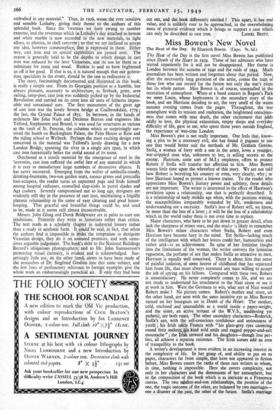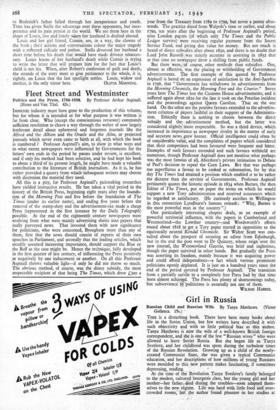Miss Bowen's New Novel
The Heat of the Day. By Elizabeth Bowen. (Cape. Os. 6d.)
autumn evening comes from the pages. Throughout the -War atmosphere with its tension and exaltation, the heightened conscious- ness that conies with 'near death, the other excitement that 'Adds oddly to love, the physical exhaustion, empty shops and everyday diffiehlty of' -gave to me, who spent those years outside England, the eit" perience of war-time. London.
MiSs Bowen's plot is not really important. One feels that, know- ing a.'plot to be a necessary evil, she has fOund it piquant to use one that 'would' better suit the methods of Mr. Graham Greene. Stella, a woman of forty with a son in the army, loves a younger, 'war-erippled man who, unknown to her, is selling secrets to• the enenty. Harrison, some sort of • M.I.5 employee, offers to protect Robert if Stella will transfer her affection• to him. Miss Bowen wastes little time upon the wherefore of this story. We are not told how_Robert is betraying his country or even, very- dearly, why,; or how ;Harrison hoped, to protect a known traitor. To the reader'
eader Who :appreciates Miss Bowen's literary poWer and subtlety, these details are not important. The writer is interested- in the effect of Harrison's revelation upon a relationship, one that is perfectly described. It is a relationship of early middle age when, with the passions_ waning, the susceptibilities irreparably wounded by life, tenderness and understanding are a necessity. Stella's loss of Robert will, we know, be more than the loss of a lover ; it will be the loss of a relationship -which in the world today there is not even time to replace.
Major characters, who have to be put down-in greater detail, often lack the sharpness of minor ones, and the reader is likely to remember Miss Bowen's minor Characters when Stella, Robert and even Harrison have become hazy in the mind. Yet Stella—lacking much of the intelligence with which her lovers credit her, hurnourlesS and rather arid—is an achievement. In spite of her feminine insight into the limitations of the woman, the writer conveys the feminine vagueness, the perfume 'of sex that makes Stella so attractive to men. Harrison is equally well conceived. There is about him that.sense of painful isolation, of some horror of childhood that has separated him from life, that must always surround any man willing to accept the job of spying on his fellows. Compared with these two, Robert is unsatisfactory. He never completely comes to life, and we are not made to understand his attachment to the Nazi cause or see it at work in him. Were the Germans to win, what sort of Nazi would Robert make ? No picture comes. Robert's mother and sister, on the other hand, are 'seen with the same intuitive eye as Miss Bowen turned on her bourgeois set in Death of -the Heart. The mother, cold, enclosed and unassailable as a world inside a paper-weight, and the sister, an active irritant of the W.V.S., maddening yet pathetic, are both exact, The Other secondary characters—Roderick, Stella's son, with the self-conscious confidence and seriousness of youth ; his Irish unde Francis with "his glass-grey eyes careering round their soCkets,4% kind wild smile and ragged pepper-and-salt moustache " ; the Irish steivard and his daughters—though less per- fect, all achieve a separate existence. The Irish scenes add an area of tranquillity to the book.
A writer's development is most evident in an increasing interest in the complexity of life. In her grasp of, and ability to put on to paper, -characters far from simple, that have not appeared in fiction before, Miss Bowen enters the ranks of those rare writers to whom, in time, nothing is impossible. Here she covers complexity, not only in her characters and the dimensions of her atmosphere, but in the composition of the book which is as intricate as a Francesca canvas. The two mbther-and-son relationships, the promise of the one, the tragic outcome of the other, are balanced by two marriages— one a disaster of the past, the other of the future. Stella's marriage The Heat of the Day is the first novel Miss Bowen has published since Death of the Heart in 1939. Those of her admirers who have waited impatiently for it will not be disappointed. Her theme is London between the autumn of 1940 and the raids of 1944. Much journalism has been written and forgotten about that 'period. Now, after the necessarily long gestation of the artist, comes the turn of those few who can record for the future not- only the war's event but its whole nature. Miss Bowen is, of course, unequalled in the recreation of atmosphere. When at a band concert in Regent's Park we meet Louie, whose haplessness is the secondary story of the book, and see Harrison deciding to act, the very smell of. the warm
to Roderick's father failed through her inexperience and youth. Time has given Stella the advantage over these opponents, but inex- perience and its pain persist in the world. We see them here in the shape of Lou!e, lost and lonely when her husband is drafted abroad.
Louie and her girl friend, Connie, are, in a way, the downs of the book ; their actions and conversations colour the major tragedy with a reflected ridicule and pathos. Stella divorced her husband a short time before his death that would have made divorce unneces- sary. Louie learns of her husband's death while Connie is trying to write the letter that will prepare him for the fact that Louie's child is not his. When, after Robert's confession of guilt and death, the strands of the story meet to give pertinence •to the whole, it is, rightly, on Louie that the last spotlight settles. Louie, widow and



































 Previous page
Previous page